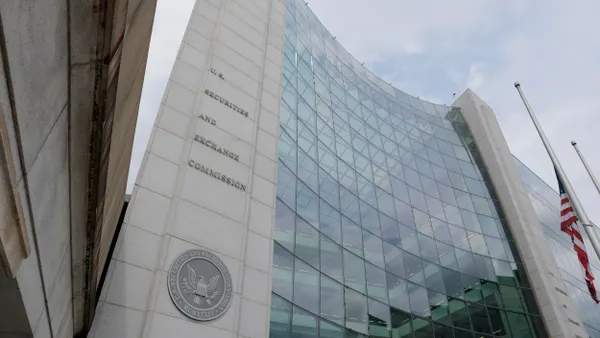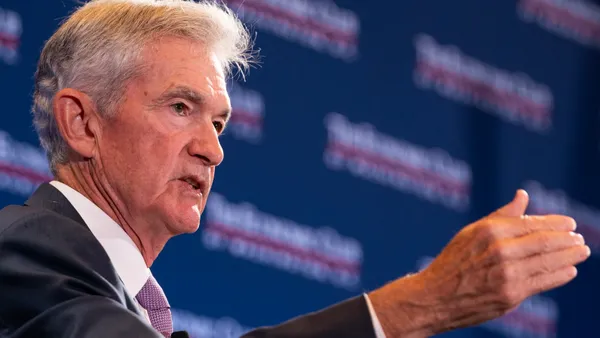Dive Brief:
- Tariffs imposed by the Trump administration have prompted companies to ratchet up their year-ahead price increases, creating an “elevated risk” of a widespread surge of inflation, economists at the Federal Reserve Bank of Atlanta said.
- Import duties may jolt the economy much like the pandemic-induced supply shocks that triggered high, broad-based inflation early this decade, the economists said. Companies that must pay tariffs have increased year-ahead price growth by 0.7 percentage points, while those facing spillover costs — but not direct costs — from tariffs plan an additional 0.3 percentage points in price growth, they said in a report.
- “The possibility of seemingly one-time tariff-related price increases becoming a full-fledged inflationary impulse — like the episode we lived through just a few years ago — is elevated,” the Atlanta Fed economists said.
Dive Insight:
The warning of higher price pressures follows a signal from Fed Chair Jerome Powell on Friday that policymakers may trim borrowing costs at a Sept. 16-17 meeting even though inflation persists above the central bank’s 2% long-run target.
“Downside risks to employment are rising,” Powell said in a speech. “If those risks materialize, they can do so quickly in the form of sharply higher layoffs and rising unemployment.”
Clearing the way for a cut to the main interest rate, Powell said, “with [monetary] policy in restrictive territory, the baseline outlook and the shifting balance of risks may warrant adjusting our policy stance.”
When exploring the outlook for inflation, Atlanta Fed economists examined data from the regional bank’s Survey of Business Uncertainty, a monthly gauge of the outlook of C-suite executives and business owners who lead private, non-agricultural companies. The national survey encompasses all major industrial sectors and gathers more than 900 responses.
“We find that business executives, on average, have ratcheted up their year-ahead price growth expectations since the end of last year,” the economists said. “Firms with supply chains that rely on imported goods have revised up their year-ahead expectations markedly.”
“Price expectations have increased meaningfully since the end of last year,” the economists said.
“Although the imposition of tariffs appears to be the catalyst for the pickup in price growth expectations, the spillover onto insulated firms raises the risk of a broad-based increase in inflation,” they said, defining “insulated firms” as those that source goods domestically and do not pay tariffs.
Powell, while warning about labor market weakness, did not brush off the threat of inflation.
“Near term risks to inflation are tilted to the upside,” he said.
The impact of import duties may be comparatively brief — a one-time jump in prices, Powell said, while cautioning that the cost of tariffs will take time to pass through supply chains and distribution networks.
“It is also possible, however, that the upward pressure on prices from tariffs could spur a more lasting inflation dynamic, and that is a risk to be assessed and managed,” Powell said.
Other Fed officials have recently flagged inflation risks.
While the job market warrants monitoring, “you also have to be nervous about the inflation side,” Richmond Fed President Tom Barkin said in a Bloomberg podcast released Monday.
Inflation is “sticky” and may accelerate to 3%, he said, noting that “people are passing on costs, and then people who don’t even have the costs are using this as a cover to pass on costs.”
The Fed’s preferred inflation measure, the personal consumption expenditures price index excluding volatile food and energy prices, likely rose 2.9% last month, inching up from 2.8% in June and further from the central bank’s 2% long-run target, Powell said.
Consumers see inflation worsening. Their average 12-month inflation expectations jumped to 6.2% this month from 5.7% in July, the Conference Board said Tuesday in a report on consumer confidence.
Write-in responses to the survey “showed that references to tariffs increased somewhat and continued to be associated with concerns about higher prices,” Stephanie Guichard, senior economist for global indicators at the Conference Board, said in a statement.
Also, “references to high prices and inflation, including food and groceries, rose again in August,” Guichard said.















